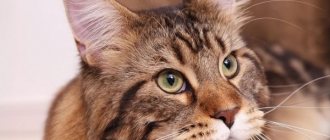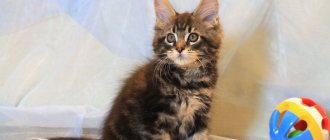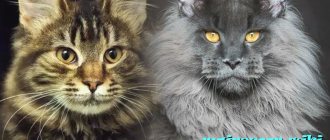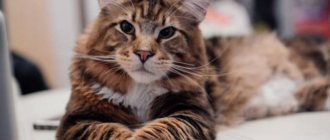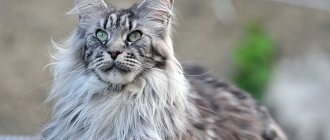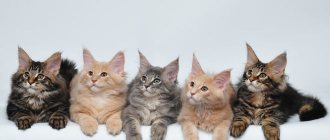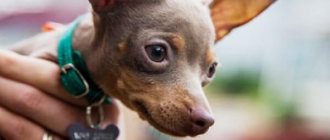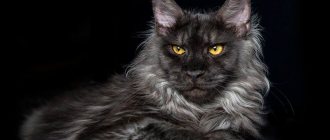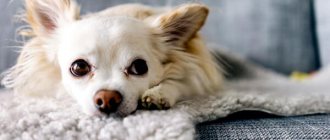The Maine Coon is a cat naturally adapted to harsh climates. Possessing amazing endurance and excellent health, it would seem that she should not cause trouble to veterinarians. And yet, sometimes these tough animals get sick, and only the owner of the animal can notice the disease in time and stop its development.
In animals of this breed, the disease most often affects the muscles and joints. Among the most common diseases of Maine Coons are diseases of the heart, blood vessels and musculoskeletal system.
As a rule, they are passed on to offspring from parents, so cat breeders are obliged to conduct breeding work very scrupulously and not allow animals with questionable heredity to breed. Sudden death in young Maine Coons and kittens is always the result of family “sores”.
Hereditary pathologies are, for the most part, incurable, but by identifying the genes responsible for them using specialized tests, it is possible to prevent the birth of unhealthy babies that will not survive to adulthood.
Incurable hereditary pathologies of Maine Coons include:
- Hypertrophic cardiomyopathy is a hardening of the heart muscle leading to embolism and heart failure. The cause of this disease is a defective gene that controls the synthesis of a protein compound that contributes to the functioning of the heart muscle. A healthy individual can be a carrier of a mutated gene, which is why tests that detect a genetic malfunction are so important in order to prevent its spread in the population.
- Hip dysplasia is not life-threatening, but can cause a lot of suffering to the animal. In this disease, the articular head does not coincide with the socket, which is why the cartilage tissue of the joint is gradually destroyed. A cat suffering from dysplasia has a wobbling gait, jumping and simply rapid movements that cause her pain, and she has frequent paw dislocations. The result of this disease is disability.
- Spinal muscular atrophy is not a fatal disease, but gradually leads to weakness and paralysis. With this disease, the neurons of the spinal cord are affected, and the muscles are gradually destroyed. The cat does not suffer from painful sensations, but it is plagued by constant tremors and involuntary muscle twitching. First, the animal loses stability, and then completely loses the ability to assume a natural, permanent position for any long period of time. Simply put, the cat can neither sit nor stand.
- Polycystic kidney disease is a hereditary anomaly in which healthy kidney tissue gradually degenerates into cysts. Polycystic disease is not characterized by severe symptoms; the onset of the disease is similar to renal failure. This disease is also incurable, but its timely detection can improve the cat’s quality of life and prolong its life.
Other Maine Coon diseases are treatable, but prevention is still preferable.
Typical diseases of Maine Coons
Although the Maine Coon is a fairly healthy and strong breed of cat . They may still have some diseases, which can be grouped into several main groups.
Diseases of the musculoskeletal system
- Purulent arthritis caused by joint injury and bacterial infection entering the wound. The course of the disease is accompanied by pain, fever and limited mobility of the animal.
- Deforming inflammation of the joint. The disease is characterized by excessive growth of bone tissue, disrupting the normal functioning of the joints of the limbs.
- Spinal muscular atrophy is an incurable genetic disease. It is caused by degeneration of spinal cord motor neurons, which leads to muscle atrophy.
- Hip dysplasia is another serious condition for Maine Coons. It is not fatal, but leads to severe pain, lameness and significant limitation of mobility.
Skin diseases
- Abscesses. This type of skin disease is the formation of cavities filled with pus, which appear when an infection enters the wound.
- Pustular diseases. These include: furunculosis, acne, streptoderma, folliculitis and other diseases caused by infection entering the body through scratches and wounds. To effectively treat affected areas with a disinfectant, the hair around them should be cut.
- Eczema. The reasons for the development of this disease are: insufficient or improper care, use of alkaline bathing products, unbalanced diet or genetic predisposition.
Kidney and urinary tract diseases
- Urolithiasis is the most common disease in this group of animals. It is especially common in regions with hard water. Poor nutrition of pets may also be to blame - the frequent presence of low-quality dry food or fish in the diet.
- Polycystic kidney disease - signs of this disease are the appearance of cysts in the kitten, which increase as the animal grows older. They cause disturbances in the functioning of the kidneys, which can lead to a complete cessation of their activity.
Other common diseases of Maine Coons
- Diseases of the digestive system. Most often, the owners of Maine Coons notice that they have a bowel disorder, which can manifest itself as a result of poor nutrition, a change in food, or some disruptions in the digestive system.
- Gum diseases. These include: stomatitis, gingivitis, bleeding and even tooth loss. The most common cause of such health problems is the abundance of soft foods in the diet. To prevent such diseases, the animal must periodically clean its teeth with a special brush and toothpaste.
- Hypertrophic cardiomyopathy. This disease is one of the most common causes of premature death in cats. The cause of disruption of the cardiovascular system is a genetic predisposition to thickening of the walls of the ventricles of the heart. There are practically no symptoms of the disease. Therefore, if an animal has had deaths from hypertrophic cardiomyopathy in its family, it should be periodically shown to a veterinarian.
Return to content
Skin diseases
Among the Maine Coon breed, three types of skin diseases are most common:
- Abscess. Can occur on any part of the body. In appearance, it is a small depression in the skin filled with pus. The pathology is treated with warm compresses; if this does not help, the abscess is opened surgically. Further treatment is prescribed by a veterinarian.
- Folliculitis and boils. These are inflammatory processes of the skin caused by infection in the wound. To stop the disease, the hair around the infected area is removed and the skin is disinfected. In addition, the four-legged patient is prescribed a course of antibiotics and vitamins are included in the diet.
- Eczema. The reasons for its appearance are varied: poor nutrition, chemical burns, lack of hygienic care. Eczema is a concern, so pets intensively scratch the problem area, causing ulcers to appear. The disease is treated with ointments and powders with an antibacterial effect, however, for a speedy recovery, it is necessary to identify and eliminate the cause of the disease.
Cost of a kitten
A kitten of this breed is quite an expensive pleasure. Prices vary greatly depending on the purpose for which the pet is purchased: for exhibitions, breeding, or, as they say, “for the sofa.”
Kittens that meet the breed standard are usually purchased in order to be bred and shown at various competitions. The cost of such individuals starts from 100 thousand rubles, and this is far from the limit. The price is determined by the breeders themselves, and may vary depending on the region.
Kittens that have any deviations from the standards are cheaper, but also not cheap - about 60 thousand rubles. Such a cat will not be accepted for an exhibition and is not suitable for breeding, but this does not mean that he cannot become a wonderful friend, companion and favorite of the whole family.
Photo gallery of Maine Coons:
Diseases of the cardiovascular system
Maine Coons have a fairly strong immune system. But if for some reason the cat is constantly sick from an early age (especially uremia or panleukopenia), it may develop myocarditis or endocarditis.
The same problems cause long-term use of medications.
Heart problems (narrowing of the aorta or pulmonary artery) occur in Maine Coons that were bred by crossing breeding individuals. The main symptoms indicating heart problems: swelling, shortness of breath, hypothermia, weakness, cardiac cough.
Maine Coons have various diseases of the cardiovascular system/Yandex Collections
How can you tell if your cat is sick?
A healthy Maine Coon is a cheerful, active cat with an excellent appetite and excellent coat . However, owners must be attentive to their pets.
Important! The appearance of the first signs of illness, a sudden change in behavior or appearance should cause concern and become a reason to seek qualified help.
A sick animal may exhibit the following signs:
- The appearance of discharge from the eyes. They can be of various types - both transparent and purulent or mucous.
- Excessive salivation, as well as plaque or sores on the tongue and gums.
- Indigestion. Vomiting and various stool disorders are typical signs of malfunctions of the digestive system. Concern should also be caused by the presence of blood, foam, worms in the animal’s stool, as well as a significant change in its color.
- Urinary disorders. These include: too frequent and excessive urination, urinary incontinence, pain when urinating or its complete absence.
- Respiratory rate disturbance. It may become rare or, conversely, more frequent. Shortness of breath, coughing, and wheezing may occur, which indicate a number of serious health problems in the animal.
- Enlarged lymph nodes. Their increased size indicates the presence of inflammatory processes in the body of Maine Coons. The lymph nodes located under the lower jaw are the first to react to this. Therefore, the owner’s task is to know the location of the latter and periodically check their condition.
- Intense thirst. This is the main symptom of a number of diseases: diabetes, kidney disease or kidney failure, uremia or the common cold.
- Deterioration of the coat condition. If the Maine Coon's coat suddenly lost its shine, became disheveled, shedding increased, the color and elasticity of the skin changed, then the animal may have become ill.
Return to content
Prevention measures
In order for the Maine Coon to please its owners for a long time and maintain excellent health, it is necessary to adhere to the following rules:
- provide your pet with a complete, balanced diet;
- provide the opportunity to perform active physical actions;
- carry out vaccination, deworming and treatment against ectoparasites in a timely manner;
- regularly conduct examinations with a veterinary specialist in order to identify hidden pathologies;
- identify genetic developmental abnormalities in kittens at an early age;
- Provide thorough coat care.
Maine Coons are a breed of cats with strong immunity. With good care, they can live for more than 15 years, remaining healthy and active. Therefore, owners need to have certain knowledge, be vigilant, and if their pets develop alarming symptoms of the disease, contact a veterinarian in a timely manner.
